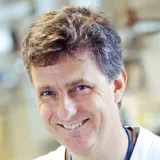Please note: this event has passed
Seminar Title: Bacterial motility, suicidal chemotaxis and the evolution of antibiotic resistance
Speaker: Dr Nuno Miguel Oliveira, BBSRC Discovery Fellow & Teaching Bye-Fellow in Zoology, University of Cambridge
Host: Professor Mike Malim, Faculty of Life Sciences and Medicine
Location: Room G4, New Hunt's House, Guy's Campus and online (join via Microsoft Teams)
Abstract: The idea that in natural environments bacteria do not live in homogenous conditions and are often exposed to gradients of nutrients, toxins and other chemicals is hardly surprising to any microbiologist. And yet, most of what we know about microbial life comes from shaking flasks, namely in the context of microbial stress responses and antimicrobial adaptation. What if bacteria could control their motility in antimicrobial landscapes and adjust their physiology accordingly? I will show that they do. I will show that a subpopulation of biofilm bacteria actively moves towards lethal concentrations of antibiotics as part of a suicidal programme where cells upregulate their own antimicrobials as they move up the imposed gradient, and that this counterintuitive behaviour can be rationalized as a counter-attack response against antibiotic-producing competitors.
My talk will have three parts. I will start by characterizing the diverse ways bacteria have to move, with particular focus on how bacterial cells bias their motion on surfaces via Type-IV pili in developing biofilms (twitching chemotaxis). Then, I will show how surface-attached bacteria navigate antibiotic gradients, where I will compare such “antibiotic taxis” with how bacteria navigate gradients of nutrients and other canonical chemoeffectors. Finally, I will show that bacterial motility can determine the evolution of antibiotic resistance. By means of computational modelling and mathematical analysis, I will show that motility can drive the adaptation rate of bacteria in antimicrobial landscapes by affecting the degree of genotype mixing and ecological competition between wildtype and resistant mutant cells that emerge in the population. Iconically, it was the fact that bacteria were “very prettily a-moving,” that caught the attention of van Leeuwenhoek, and thus made us aware of their existence. My talk will highlight that, in addition to being a pretty display, motility can help us to understand how bacteria respond and adapt to antimicrobial stress.
Dr Nuno Miguel Oliveira, BBSRC Discovery Fellow & Teaching Bye-Fellow in Zoology, University of Cambridge
Biography: Broadly speaking, Nuno is interested in microbial behaviour, ecology and evolution. The interest for microbial biology became particularly crystalized during his PhD studies at the University of Oxford under Prof. Kevin Foster, with whom Nuno helped to explain multiple aspects related to microbial communities and their governing dynamics, including the evolution of cross-feeding between strains and species, biofilm formation as a response to ecological competition, and how biofilm cells actively move and position themselves in their community with submicron precision.
From Oxford Zoology, where he learned the principles of behaviour, ecology and evolution, together with microbial genetics, Nuno then moved to Cambridge Mathematics where he has been developing multiple skills, including mathematical analysis, microfluidics to generate controlled environments, and single-cell tracking microscopy.
In Cambridge, Nuno has been fortunate to explore his own research interests, first with a Herchel Smith Postdoctoral Fellowship, with a Wellcome Trust Interdisciplinary Fellowship, and then with a BBSRC Discovery Fellowship. Nuno’s current research seeks to explain two unexpected microbial processes that he discovered during his earlier studies: how biofilm bacteria control motility in stress conditions that change in time and space such as antimicrobial landscapes and how these motile responses contribute to the evolution of antimicrobial resistance; and how luminous bacteria produce light as a response to mechanical stress from hydrodynamic conditions they find in the ocean.
In spite of the ever-intensifying passion for microbial behaviour, ecology, and evolution, Nuno lives another life away from the lab that he very much enjoys, and this life happens in historical archives. Nuno has an MA in History of Medicine completed at the Johns Hopkins University as a part-time student while doing his microbiology research at Cambridge, and he is currently doing a PhD in the History and Philosophy of Science at the University of Cambridge, again as a part-time student.
Nuno believes that, in addition to being a source of inspiration, history of science gives us a perspective of space and time in science that the scientific method alone does not. It fosters an appreciation for the conditions of possibility that led to scientific success, as well as, to scientific failure. In particular, Nuno is keen to understand how different research cultures interact and resolve disagreement, and the influence of different sponsors for what we know, and do not know, about the natural world. Nuno is Portuguese, and he likes to believe that he is part of a long tradition of exploring the unknown.
Event details
Room G4New Hunt’s House
Great Maze Pond, London, SE1 9RT

